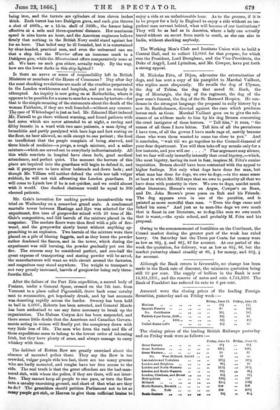M. Nicholas Fetu, of Dijon, advocates the extermination of dogs,
and has sent a copy of his pamphlet to Marshal Vaillant, who replies most eloquently. He recalls the dog of Ulysses, the dog of Tobias, the dog that saved St. Roch, the dog of Montargie, the dog of the regiment, the dog of the poor man's funeral, the dog of the St. Bernard Hospice. He con- demns in the strongest language the proposal to sully history by a new St. Bartholomew, directed against the race which produces heroes such as these. Marshal Vaillant goes on to give the sub- stance of an address made to him by his dog Brusea concerning the cruel instigator of these horrors. "Tell him," it runs, "the names of all those I have bitten. Tell him of all the pantaloons I have torn, of all the gowns I have made rags of, merely because those who wore them wanted to come too close to you." And it concludes, "wait till we go together to the Council-General of your dear department. You will then take off my muzzle only for a few instants, and you will see . . . ." That argument may silence, but we fear will only inwardly intensify that cruel bigotry,—which, like most bigotry, having its root in fear, inspires M. Fetu's canine inquisition. Brasca should have been contented with the appeal to higher feelings. Not only what dogs have done for man, but what man has done for dogs, we owe to dogs,—in the same sense at least in which Mr. Mill says that we owe to posterity all that we have done with posterity in view. We owe to dogs, amidst much other literature, Homer's verse on Argue, Cowper's on Beau, and Dr. John Brown's prose poem on Rab and his Friends. The dog appears even in one of the parables, and is painted as more merciful than man. "Even the dogs came and licked his sores." And just as to man-like dogs we owe much that is finest in our literature, so to dog-like men we owe much that is worst,—the cynic school, and probably M. Feta and his proposal.






























 Previous page
Previous page